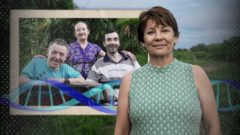Residents of Serrinha dos Pintos, a remote town in northeastern Brazil, grappled for years with the mysterious condition that caused children to lose their ability to walk. It was not until geneticist Silvana Santos arrived two decades ago that they received a diagnosis for the ailment, now known as Spoan syndrome. This condition, stemming from a genetic mutation that affects the nervous system, requires both parents to carry the altered gene for it to manifest.
Santos's breakthrough marked the first documentation of the disease. Now one of the BBC's 100 most influential women in 2024, she brought hope and clarity to struggling families. Marquinhos, a patient, reflects, “She gave us a diagnosis we never had. After the research, help came: people, funding, wheelchairs.”
Socially, Serrinha dos Pintos reflects a unique reality, with family ties often running deep. Through the lens of identity, Santos learned that many of her neighbors in São Paulo were cousins related to residents of Serrinha. Marriages among cousins are not unusual due to geographic isolation, leading to a notable prevalence of genetic disorders. Worldwide, such marriages occur in about 10% of relationships, but in the town, studies indicated that over 30% of couples are related.
According to geneticist Luzivan Costa Reis, marrying within close familial ties raises the risk of genetic disabilities. While only 2-3% of unrelated couples may have children with rare disorders, this figure rises to between 5-6% for cousins.
Santos embarked on an arduous quest to diagnose Spoan syndrome, leading her to collect DNA from families across Serrinha. Her efforts culminated in a landmark 2005 study revealing the genetic underpinnings of Spoan. The mutation implicated a loss of chromosome segments that results in the overproduction of a critical brain protein. An interesting dimension of Her research hinted that the genetic variant likely arrived in Brazil centuries ago with early European settlers.
Yet, despite the daunting prognosis of Spoan, social perceptions have shifted. Modern attitudes have replaced derogatory labels with nuanced understandings of those affected. The introduction of wheelchairs has significantly improved quality of life and independence for patients.
The community's future remains intertwined with its past; Larissa Queiroz, an affected niece of two patients, reflects on the familial bonds, stating, “In Serrinha dos Pintos, deep down, we're all cousins.”
Santos continues to support ongoing research focusing on genetic risks associated with familial marriages, aiming to provide couples with insights rather than to dismantle their relationships. Now a university professor with a genetics education center, her commitment to empowering families in the northeast of Brazil shapes her legacy as she returns to Serrinha, reaffirming her ties with the community.








